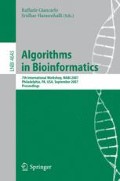Abstract
Background: Protein domains are the common functional elements used by nature to generate tremendous diversity among proteins, and they are used repeatedly in different combinations across all major domains of life. In this paper we address the problem of using similarity to known protein domains in helping with the identification of genes in a DNA sequence. We have adapted the generalized hidden Markov model (GHMM) architecture of the ab intio gene finder GlimmerHMM such that a higher probability is assigned to exons that contain homologues to protein domains. To our knowledge, this domain homology based approach has not been used previously in the context of ab initio gene prediction. Results: GlimmerHMM was augmented with a protein domain module that recognizes gene structures that are similar to Pfam models. The augmented system, GlimmerHMM+, shows 2% improvement in sensitivity and a 1% increase in specificity in predicting exact gene structures compared to GlimmerHMM without this option. These results were obtained on two very different model organisms: Arabidopsis thaliana (mustard wee) and Danio rerio (zebrafish), and together these preliminary results demonstrate the value of using protein domain homology in gene prediction. The results obtained are encouraging, and we believe that a more comprehensive approach including a model that reflects the statistical characteristics of specific sets of protein domain families would result in a greater increase of the accuracy of gene prediction. GlimmerHMM and GlimmerHMM+ are freely available as open source software at http://cbcb.umd.edu/software.
Access this chapter
Tax calculation will be finalised at checkout
Purchases are for personal use only
Preview
Unable to display preview. Download preview PDF.
References
Allen, J.E., Majoros, W.H., Pertea, M., Salzberg, S.L.: JIGSAW,GeneZilla, and GlimmerHMM: puzzling out the features of human genes in the ENCODE regions. Genome Biol. 7(suppl 1:S9), 1–13 (2006)
Ashurst, J.L., Chen, C.K., Gilbert, J.G., Jekosch, K., Keenan, S., Meidl, P., Searle, S.M., Stalker, J., Storey, R., Trevanion, S., Wilming, L., Hubbard, T.: The Vertebrate Genome Annotation (Vega) database. Nucleic Acids Res. 33(Database issue), D459–D465 (2005)
Eddy, S.R.: Profile hidden Markov models. Bioinformatics 14(9), 755–763 (1998)
Finn, R.D., Mistry, J., Schuster-Bockler, B., Griffiths-Jones, S., Hollich, V., Lassmann, T., Moxon, S., Marshall, M., Khanna, A., Durbin, R., Eddy, S.R., Sonnhammer, E.L., Bateman, A.: Pfam: clans, web tools and services. Nucleic Acids Res. 34(Database issue), D247–D251 (2006)
Guigo, R., Flicek, P., Abril, J.F., Reymond, A., Lagarde, J., Denoeud, F., Antonarakis, S., Ashburner, M., Bajic, V.B., Birney, E., Castelo, R., Eyras, E., Ucla, C., Gingeras, T.R., Harrow, J., Hubbard, T., Lewis, S.E., Reese, M.G.: EGASP: the human ENCODE Genome Annotation Assessment Project. Genome Biol. 7(Suppl 1:S2), 1–31 (2006)
Haas, B.J., Volfovsky, N., Town, C.D., Troukhan, M., Alexandrov, N., Feldmann, K.A., Flavell, R.B., White, O., Salzberg, S.L.: Full-length messenger RNA sequences greatly improve genome annotation. Genome Biol. 3(6), RESEARCH0029 (2002)
Krogh, A.: Using database matches with for HMMGene for automated gene detection in Drosophila. Genome Res. 10(4), 523–528 (2000)
Majoros, W.H., Pertea, M., Salzberg, S.L.: TigrScan and GlimmerHMM: two open source ab initio eukaryotic gene-finders. Bioinformatics 20(16), 2878–2879 (2004)
Ponting, C.P., Russell, R.R.: The natural history of protein domains. Annu. Rev. Biophys. Biomol. Struct. 31, 45–71 (2002)
Reese, M.G., Kulp, D., Tammana, H., Haussler, D.: Genie–gene finding in Drosophila melanogaster. Genome Res. 10(4), 529–538 (2000)
Solovyev, V., Kosarev, P., Seledsov, I., Vorobyev, D.: Automatic annotation of eukaryotic genes, pseudogenes and promoters. Genome Biol. 7(Suppl 1:S10), 1–12 (2006)
Wei, C., Brent, M.R.: Using ESTs to improve the accuracy of de novo gene prediction. BMC Bioinformatics 7, 327 (2006)
Zhang, M.Q.: Computational prediction of eukaryotic protein-coding genes. Nat. Rev. Genet. 3(9), 698–709 (2002)
Author information
Authors and Affiliations
Editor information
Rights and permissions
Copyright information
© 2007 Springer-Verlag Berlin Heidelberg
About this paper
Cite this paper
Pertea, M., Salzberg, S.L. (2007). Using Protein Domains to Improve the Accuracy of Ab Initio Gene Finding. In: Giancarlo, R., Hannenhalli, S. (eds) Algorithms in Bioinformatics. WABI 2007. Lecture Notes in Computer Science(), vol 4645. Springer, Berlin, Heidelberg. https://doi.org/10.1007/978-3-540-74126-8_20
Download citation
DOI: https://doi.org/10.1007/978-3-540-74126-8_20
Publisher Name: Springer, Berlin, Heidelberg
Print ISBN: 978-3-540-74125-1
Online ISBN: 978-3-540-74126-8
eBook Packages: Computer ScienceComputer Science (R0)

